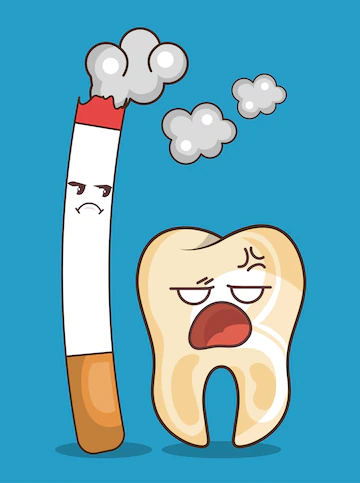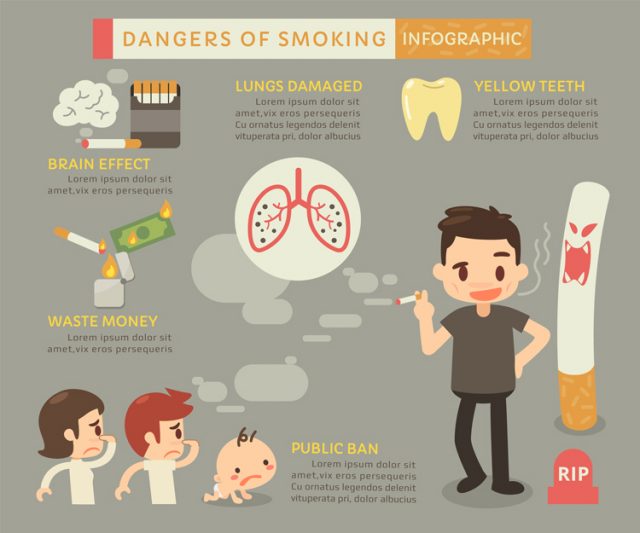The Effects Of Cigarettes And Tobacco Products On Oral And Dental Health
It is scientifically proven that all tobacco products have a negative impact on our health in many areas. When it comes to the negative effects of smoking on health, we all think of diseases such as lung cancer, heart disease and asthma. However, the first stop of tobacco products is the mouth. And of course, the use of cigarettes and tobacco products is harmful to oral and dental health.

When we talk about the intraoral effects of smoking;
- Smokers’ mouths are more likely to produce and accumulate bacteria that cause gum disease. The lack of oxygen in the gums caused by smoking impairs blood circulation. Therefore, infected gums cannot heal. Smoking also affects your immune system, making it harder for your body to fight off diseases like gum disease. Periodontal treatment may not be as successful for smokers as for non-smokers. Tobacco also irritates the gums, causing them to recede.
- Dental bridges, implants and dentures in the mouth are discoloured in smoking patients. In addition, dark brown stains and tar residue accumulate on the patient’s own teeth. Aesthetically, the patient may feel uncomfortable. Restoration of discolouration on teeth to their original state without any stains depends on exposure to cigarettes and depth of discolouration. Exposure of teeth to chemicals in cigarettes weakens the protective layer of enamel, causes teeth to become more sensitive and stains to penetrate deeper layers.
- Tooth sensitivity occurs in smokers because the enamel is weakened. Damaged enamel surfaces become sensitive to heat and cold.
- The healing process of wounds or surgical procedures in the mouth is delayed in smokers. For this reason, dentists should advise their patients not to smoke after any surgical procedure until wound healing is complete.
- Although not certain, nicotine in cigarettes is thought to stimulate the sympathetic nervous system with its pharmacokinetic effect. One of the effects of this is hyposalivation, i.e. less salivation. Dryness of the mouth due to hyposalivation facilitates the adhesion of bacterial plaques to the surface of the gums and teeth.
- When the protective enamel weakens, the teeth become weaker against acids, bacteria and other destructive agents. A suitable substrate is prepared for the formation of caries.
- People who smoke have bad breath, called halitosis. Smoking affects the chemistry of the mouth and causes excessive plaque formation. Smokers should not forget that they have to live with bad breath all the time.
- Leukoplakia is the term used to describe white or bluish thickening in the oral cavity or salivary membranes and on the inside of the cheeks, tongue, gums, palate and throat wall. Although the exact cause of leukoplakia is not known, it occurs mainly in smokers. Oral irritation in smokers is thought to be an important and effective factor in the development of the disease.
- Together with smoking, lesions on the tongue may occur. Eating food that is too hot or too spicy by tobacco users can cause irritation or redness of the tongue.
- Smoking plays a major role in most cases of diagnosed oral cancer. If you are exposed to cigarettes over time and repeatedly, the chemicals in cigarettes can cause changes in the oral cavity and lead to oral cancer. Formation of painless swellings in the mouth, white-red foci in the mouth, pain that does not go away in advanced cases with tissue destruction, difficulty swallowing, bleeding foci in the mouth, difficulty speaking, difficulty opening the jaw, are among the symptoms of oral cancer. People who notice these symptoms should see their dentist immediately.

So what should we do to prevent smoking-related damage in the mouth?
- Although there are special mouthwashes and toothpastes for smokers, these products are almost ineffective against the damage caused by smoking.
- The oral health of people who use cigarettes and tobacco products should be taken care of by a dentist.
- Smokers should have their teeth checked regularly, for example every 6 months.
- Smokers should brush their teeth at least three times a day. Hard brushes are more effective in whitening teeth. Teeth should be brushed especially in the evening before going to bed.
- Pastes containing activated charcoal, which are based on bacteria removal, should be preferred.
- Teeth should be cleaned regularly by the dentist.
- The consumption of coffee, tea and acidic drinks by smokers has an additional negative effect on teeth whitening and health. When consuming cigarettes with such drinks, the mouth should be rinsed thoroughly with plenty of water.
It should be remembered that if starting to smoke is a personal decision, quitting is a decision that a person can make by using their will and seeking the support of a professional doctor if needed. When we quit smoking, we can expect healthy and white teeth, a healthy body and fresh breath, healthy gums.
Finally, it should be noted that in addition to smokers, passive smokers who do not smoke but inhale cigarette smoke are also exposed to all the harm caused by smoking.
We wish you healthy days


